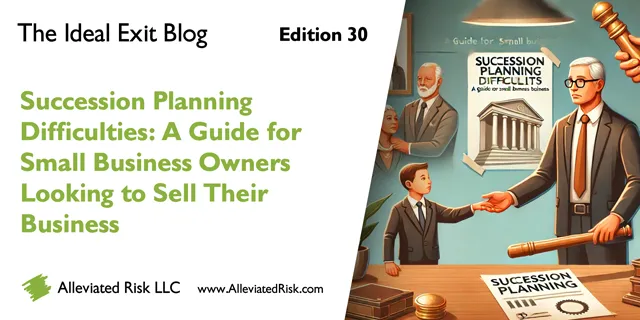
Succession Planning Difficulties: A Guide for Small Business Owners Looking to Sell Their Business - The Ideal Exit Blog - Edition 30
When it comes to the long-term vision for your small business, succession planning is an essential yet often overlooked aspect. As a small business owner, you’ve poured your heart and soul into building your enterprise from the ground up. The idea of handing over your business to someone else can be emotional and complex. However, a well-thought-out succession plan can ensure that your business continues to thrive even after you step down. Let’s delve into the common difficulties of succession planning and how you can navigate them effectively.
1. Emotional Attachment
One of the most significant challenges in succession planning is the emotional attachment you have to your business. After years of hard work, it’s natural to feel a deep connection to your company. This emotional bond can make it difficult to objectively plan for the future.
Solution: Understand that succession planning is a step toward the continuity and success of your business. Seek emotional support from family, friends, or a professional counselor to help you cope with the transition.
2. Finding the Right Successor
Identifying a suitable successor can be another major hurdle. Whether you’re considering a family member, a current employee, or an external buyer, each option comes with its own set of challenges.
Solution: Create a clear set of criteria for your successor. Look for someone who not only understands the business but is also passionate about continuing its legacy. Consider offering training and mentorship to prepare them for their new role.
3. Financial Considerations
Succession planning often involves complex financial transactions. Determining the value of your business, structuring the deal, and navigating tax implications can be overwhelming.
Solution: Consult with financial advisors and accountants to get a clear picture of your business’s financial health. They can help you understand the valuation process and guide you through the financial intricacies of selling your business.
4. Legal Complications
Transferring ownership of a business involves various legal aspects. From drafting agreements to ensuring compliance with regulations, the legal complexities can be daunting.
Solution: Engage a lawyer specializing in business transactions early in the process. They can help you navigate legal requirements, draft necessary documents, and ensure a smooth transition.
5. Communication Gaps
Failing to communicate your succession plan effectively can lead to misunderstandings and conflicts among stakeholders, including family members, employees, and customers.
Solution: Develop a comprehensive communication strategy. Clearly articulate your succession plan to all relevant parties and address any concerns they may have. Open and transparent communication can ease the transition process.
6. Maintaining Business Continuity
Ensuring that your business continues to thrive during the transition period is crucial. Disruptions can negatively impact your business’s performance and reputation.
Solution: Develop a detailed transition plan that outlines each step of the process. Involve key employees in the planning stages to ensure they are prepared to maintain operations seamlessly.
7. Timing the Transition
Timing is critical in succession planning. Transitioning too early or too late can have adverse effects on your business.
Solution: Start planning early and be flexible with your timeline. Regularly review and update your succession plan to reflect any changes in your business or personal circumstances.
Conclusion
Succession planning is a complex and multifaceted process that requires careful consideration and strategic planning. While the difficulties may seem overwhelming, addressing these challenges head-on can pave the way for a successful transition. By seeking professional guidance and involving all stakeholders, you can ensure that your business continues to prosper long after you’ve stepped down. Remember, a well-executed succession plan is a testament to your commitment to the long-term success of your business.
If you’re a small business owner considering selling your business, start your succession planning today. It’s never too early to secure the future of your hard-earned legacy.
My Ideal Exit Newsletter
Looking to sell your small business and want to maximize its value?
Our 💥💥 exclusive newsletter 💥💥 offers actionable insights on business valuation, expert tips for creating a winning exit strategy, and the latest market trends in acquisitions. You’ll make your business more attractive before the sale. Sign up now to stay ahead in your journey toward a successful business exit!
👉👉👉 Signup Here Today 👉👉👉 https://www.alleviatedrisk.com/get-the-ideal-exit-newsletter
We cover elements to enhance your preparedness for selling a business, and ultimately achieve your 🎯 goal of achieving My Ideal Exit.
1. 📊 Valuation Expertise: Insights on how to maximize the value of your business.
2. ⛵ Exit Strategy Optimization: Tips on planning a smooth and profitable exit.
3. 📈 Market Trends: Stay updated on current mergers, acquisitions, and industry shifts.
4. 🤝 Buyer Connections: Discover potential buyers and strategic partnerships.
5. 💰 Business Growth Hacks: Strategies to boost business attractiveness before a sale.

